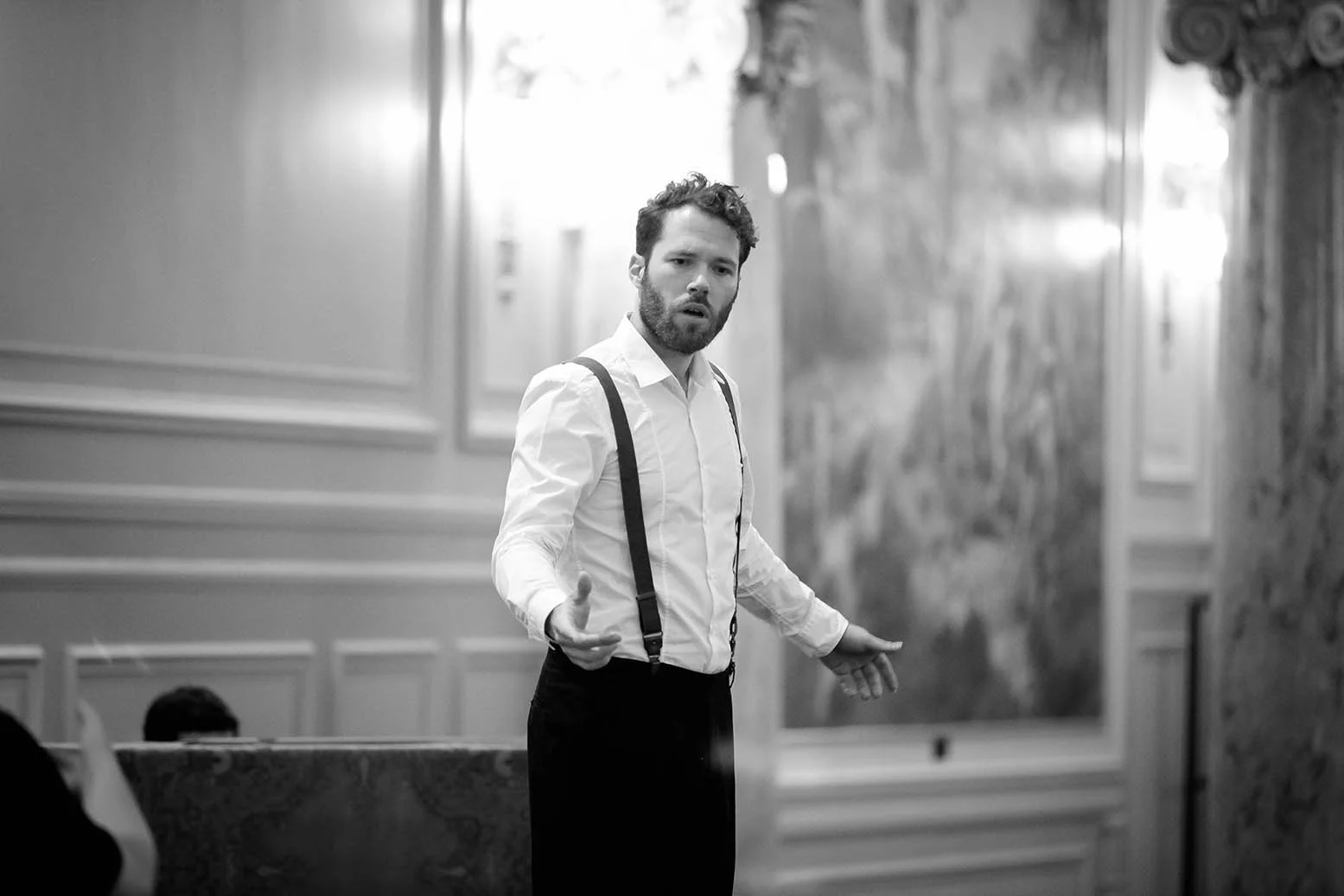


Composers Studio
Composers Studio
Composers Studio
Composers Studio
‘The Chef and the Sommelier’
Music by Emily Hazrati
Libretto by Nazli Tabatabai-Khatambakhsh
Sung by Ella de Jongh (Soprano)
Jacob Harrison (Bass-Baritone)
Played by Aoife Moran
The following is a summary of how the Composers Studio was conceived, with its focus centred on opera. Our aim is to develop the programme along the same collaborative principles to integrate with the dance and chamber music programmes.
“The aim of the Composers Studio is to give aspiring opera composers intensive exposure to opera creation by working and living alongside opera being rehearsed and performed. Essentially, they form part of the creative ensemble and see and hear the work they make being integrated as part of the singers’ normal routine. The Composers Studio also seeks to address the issue that while many composers have ambitions to write opera or music theatre works, there is a lack of opportunity to gain experience working alongside singers and opera in production.
The uniqueness of the opportunity stems from working in parallel with young singers rehearsing an opera production and/or opera scenes and benefitting not only from the part of the course specifically designed for them, but also observing and participating in rehearsals (possibly as instrumentalists in some way). In particular they benefit from the mentoring and close observation of the Director and Music Director as they work with the singers in a variety of contexts, from basic stage training and movement, supervision of vocal coaching, to rehearsing for production. This level of professional expertise is not readily available outside a fully functioning opera house.
The composers divide their time between:
A programme of work (the ‘Fundamentals Programme’) focused on increasing skills and sensitivity towards all aspects of opera.
Actively observing, participating and being mentored in rehearsals.
Participating in seeing the work they make being developed, rehearsed and performed.
The Fundamentals Programme of work is concerned with acquiring or sharpening basic skills. These include narrative and dramaturgy, structural development and the application of music and form. It partly uses a process of ‘Lab’ work. Labs are where composers in a self-contained unit explore aspects of opera making usually by taking a theme and developing short scenes from scratch. They write the libretto, the music, consider the visual element – and even perform the scene themselves (or with limited help). The process alerts composers to the elements involved in musico-dramatic forms and enables them to explore how they interact.”
We are pleased to include below Librettist Zoe Palmer’s poem “3 Carp” inspired by the Château Lake in Fontainebleau, and written in the rehearsal room.
3 Carp
Three carp rise up from the
thousand question marks of
a dark pond
gleaming half-moons
break through
the surface
flicking fine, split-second rainbows
into the afternoon
as they heave their wet-weight
back down again
through the green filter
where chords of light
split into a chorus of dancers
who dive deeper
then drown
altogether.
What secrets have you come to whisper?
In the O of your mouth-muscle
tiny mirrors of heavy clouds
quiver
then deflate as you suck back in again
for a moment
your fish eyes catch the two of us
hand-in-hand on the riverbank
listening for your song of deep water
streaming out over your gills.
By Zoe Palmer

ShapeChanger Programme
ShapeChanger
ShapeChanger Programme
ShapeChanger
ShapeChanger © 2014 Susan Schiffer
www.schiffervisionart.com
ShapeChanger is a concept whereby the essence of our summer work is shared with our collaborative partners at other times of the year. This could take the form of a preparatory workshop prior to the summer course in order to prepare participating students for the summer training, or it could be a means to develop further the work done on the summer course a few weeks or months later.. Equally, it could be a taste of Performance Arts Lab for students who are not able to attend the summer course for whatever reason, or who are not yet experienced enough to work at the level of the summer programme. In this way, we would hope to provide encouragement and training for as wide a range of participants, and to facilitate as much collaboration and cross-disciplinary interaction as possible.
Workshops would run over a weekend or for periods of up to five days. The focus could be on a particular facet of one discipline, for example, the singing and acting of recitative, or on the creation of new work in any given discipline, or indeed on investigating new ways of combining disciplines, for example singing and dance. Our interest in the crucial area of interaction between creators and performers would be key to as many of these workshops as possible.
In addition, we will use ShapeChanger as a means of investigating and facilitating new ways in which the arts and business sectors could work together.


